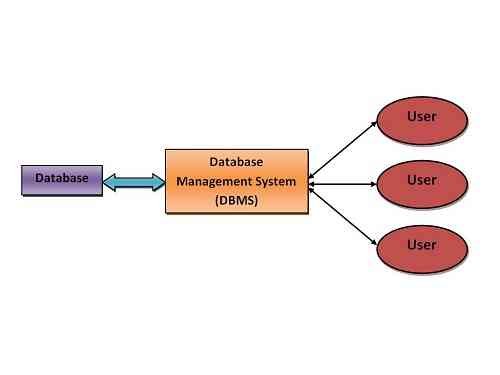Introduction to Database Management System (DBMS)
A data is anything in a form of Quantity, character or a symbol suitable for use in a computer. Data is distinguished from program. A program is a set of data to perform a task in a computer.
A database is a set of instructions or a collection of related data from which users can be easily retrieve and accessed the desired information.
A database system is designed to managing the data or a large amount of information. A database system is an integrated collection of related files. Management of data involves structures for storage of information and to ensure about the safety of information stored.
A database management system (DBMS) is a system or a program that allows users to access the collection of data which stored in a database. The main objective of DBMS is to provide a convenient and effective technique of storing and retrieving the database information.
The database and database management systems plays an important role in day to day life for storing and retrieving an information. It is very essential for the management of banking, restaurants, government organizations, schools and colleges, etc.

Data, Information and Meta Data:
Data and information are closely related to each other and often used interchangeably. Information is nothing but processed or refined data.
The term data is anything in a form of Quantity, character or a symbol suitable for use in a computer.
Information is a data can be put into meaningful and useful content. Information consists of text, image, audio, video, etc.
Meta data is a data about data. It is a structural component which is describe in the form of tables and their elements.
Database Management System (DBMS):
Database is a collection of interrelated data stored to the server. Databases are organized by fields, records and files. It is designed to managing the data or a large amount of information.
Database Management System (DBMS) is a program or a group of programs which can be work in an operating system to manage, store and process the data. It is a system or a program that allows users to access the collection of data which stored in a database. It acts as an interface between the program and the data stored in a database system.
Database System Applications:
Database systems are widely used around the world. Following are the various applications of database management systems:
1. Banking:
It is used to store the customer information such as name, account details, transactions, enquiries, loan details, credits, debits, etc.
2. Universities:
Database is widely used in universities to store the information of a students, admission, registrations, data of results, etc.
3. Airlines:
Airlines are the first to use databases. It is used to storing information about the seats, reservations, information of passengers.
4. Railways:
Database is used widely in railways to storing the information about passengers, reservations, seats availability, etc.
5. Sales:
It is used to store the information about customers, products, sales and purchase information. Whenever a customer buys any product it can be store into a database.
6. Manufacturing:
Database is used widely in manufacturing to store information about sales, purchase, CAD drawings, information of inventory, raw material availability, etc.
7. Telecommunication:
Database is used in telecommunication to store the information about the phones and mobiles call records, incoming and outgoing calls timing, duration, to generate the charges and store the information to the communication network.
8. Human Resources:
Databases are used in human resources widely to storing the information such as the employees’ records, salaries, taxes, benefits, etc.
Advantages of Database Management System:
- DBMS provides an efficient access to store and retrieve data.
- DBMS provides an abstract view of data independence.
- DBMS provides facilities for recovering the backup data from software or hardware.
- DBMS provides availability of updated information for all users.
- It restrict to the unauthorized access of data. It provides a data security.
- DBMS provides centralized administration of data.
- DBMS provides centralized administration of data.
- It represents the complex relationships of data.
Disadvantages of Database Management System:
- Database management system is very expensive as compared to data manipulation.
- It requires specialized people and man power.
- DBMS performance is not adequate for certain specialized applications.
- Complexity of recovering backup data and its time consuming.
- DBMS need to manipulate the data.
Database Administrator (DBA):
Database Administrator (DBA) is a person or a group of persons who can control the overall database system. DBA is a person who responsible for overall administration of the database.
The responsibilities of DBA include:
- The DBA creates the storage structure of database schema.
- The DBA creates the original database schema by executing a set of data.
- The DBA maintain the store data and information in the database.
- The DBA carries out the changes to the schema and physical organization to reflect the changing need of an organization.




